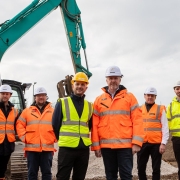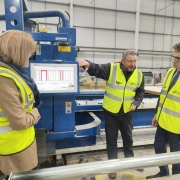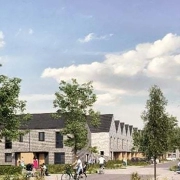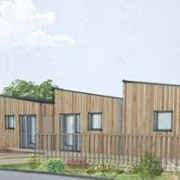Specialist low carbon developer and modular manufacturer Starship is bringing forward a project in Wallasey, Wirral, which is set to be one of the largest modular carbon zero housing developments in the North West.
In partnership with North West housing association, Onward Homes, and supported by Homes England and the Liverpool City Region Brownfield Land Fund, which has allocated £195,000 to the project, Starship will deliver 13 carbon zero homes across a 64,000 sq ft site in Wallasey.
Constructed using low carbon Modern Methods of Construction (MMC), the Greenleas project will use eco-friendly construction methods by prioritising energy efficiency from the start of the design and development process.
Situated on undeveloped land at the bottom of Greenleas Close in Wallasey, the three-bedroom homes will be built with strong eco-credentials, holding an impressive EPC rating of A.
Onward Homes is one of the largest providers of social housing based in the North West, with more than 35,000 homes across the region. This development is Starship’s first project with Onward Homes and is expected to be completed in just over 40 weeks.
The MMC homes will be built in Starship’s Wirral Waters based factory, with each home taking a week to build and a day and a half to be erected on site.

Image credit: Starship
Dave Dargan, co-founder and chief executive of Starship, said: “At Starship, we are purpose driven to build better, and we have a strong commitment to low-carbon living, ensuring that everything we do is led by our commitment to the green agenda.
“Forming a partnership with Onward Homes is an exciting opportunity for us to continue delivering gold-standard, carbon zero homes and developing long-lasting communities with sustainability at their core. Greenleas will become a fantastic new addition to Wallasey, providing people with modern homes in the heart of one of Wirral’s most up and coming areas.”
Bronwen Rapley, chief executive of Onward Homes, added: “Onward is committed to becoming a leading environmentally-friendly landlord across the North West, providing warm and affordable homes in greener neighbourhoods for our customers to enjoy. Starship’s cutting-edge homes promise to make a real difference in this part of Wallasey, helping local people take their first steps on the property ladder while ‘treading lighter’ on the local environment through sustainable design and manufacturing.”
Cllr Graham Morgan, Liverpool City Region portfolio holder for housing and spatial planning, said building on brownfield sites was a central part of plans “to ensure there is a great choice of high-quality homes, right across the city region, as part of our ambitious plans to tackle the housing crisis.”







